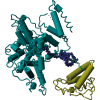The government’s national action plan will commit the UK to reducing its use of antimicrobials – such as antibiotics, antifungals and antivirals – in humans and animals, strengthen surveillance of drug-resistant infections before they emerge and incentivise industry to develop the next generation of treatments.

It commits to continue to innovate through initiatives such as the expansion of the world-first “subscription model” for antimicrobials, which was launched in 2019 as a pilot.
This will see more companies paid a fixed annual fee for antimicrobials based primarily on their value to the NHS, as opposed to the volumes used.
The plan will build on progress towards the UK’s 20-year vision for AMR, which will see AMR contained, controlled and mitigated.
Health Minister Maria Caulfield said: “Our five-year action plan outlines our commitment to leading the way in tackling AMR, including through expanding our world-first subscription model to accelerate research into new treatments.
“In a world recovering from the profound impact of the COVID-19 pandemic, international collaboration and preparedness for global health challenges have taken on an unprecedented level of importance.”
This is the second of a series of five-year national action plans that will ensure sustained progress by tackling the global threat of AMR.
- The 2024 to 2029 national action plan is organised into four themes: human health, animal health, agriculture and the environment.
- The UK 20-year vision for antimicrobial resistance aims for AMR to be effectively contained, controlled and mitigated by 2040.
- It is estimated that in 2019, 1.27 million deaths globally were caused by antibiotic-resistant infections.
Image credit | Science Photolibrary




